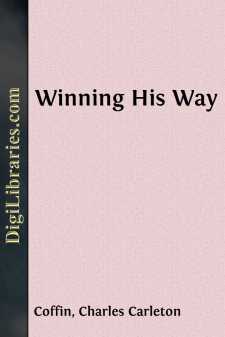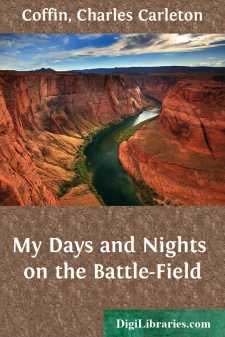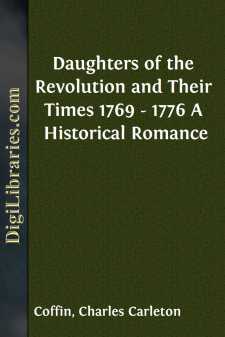Categories
- Antiques & Collectibles 13
- Architecture 36
- Art 48
- Bibles 22
- Biography & Autobiography 813
- Body, Mind & Spirit 142
- Business & Economics 28
- Children's Books 17
- Children's Fiction 14
- Computers 4
- Cooking 94
- Crafts & Hobbies 4
- Drama 346
- Education 46
- Family & Relationships 57
- Fiction 11829
- Games 19
- Gardening 17
- Health & Fitness 34
- History 1377
- House & Home 1
- Humor 147
- Juvenile Fiction 1873
- Juvenile Nonfiction 202
- Language Arts & Disciplines 88
- Law 16
- Literary Collections 686
- Literary Criticism 179
- Mathematics 13
- Medical 41
- Music 40
- Nature 179
- Non-Classifiable 1768
- Performing Arts 7
- Periodicals 1453
- Philosophy 64
- Photography 2
- Poetry 896
- Political Science 203
- Psychology 42
- Reference 154
- Religion 513
- Science 126
- Self-Help 84
- Social Science 81
- Sports & Recreation 34
- Study Aids 3
- Technology & Engineering 59
- Transportation 23
- Travel 463
- True Crime 29
Winning His Way
Categories:
Description:
Excerpt
CHAPTER I.
Many years ago, before railroads were thought of, a company of Connecticut farmers, who had heard marvellous stories of the richness of the land in the West, sold their farms, packed up their goods, bade adieu to their friends, and with their families started for Ohio.
After weeks of travel over dusty roads, they came to a beautiful valley, watered by a winding river. The hills around were fair and sunny. There were groves of oaks, and maples, and lindens. The air was fragrant with honeysuckle and jasmine. There was plenty of game. The swift-footed deer browsed the tender grass upon the hills. Squirrels chattered in the trees and the ringdoves cooed in the depths of the forest. The place was so fertile and fair, so pleasant and peaceful, that the emigrants made it their home, and called it New Hope.
They built a mill upon the river. They laid out a wide, level street, and a public square, erected a school-house, and then a church. One of their number opened a store. Other settlers came, and, as the years passed by, the village rang with the shouts of children pouring from the school-house for a frolic upon the square. Glorious times they had beneath the oaks and maples.
One of the jolliest of the boys was Paul Parker, only son of Widow Parker, who lived in a little old house, shaded by a great maple, on the outskirts of the village. Her husband died when Paul was in his cradle. Paul's grandfather was still living. The people called him "Old Pensioner Parker," for he fought at Bunker Hill, and received a pension from government. He was hale and hearty, though more than eighty years of age.
The pension was the main support of the family. They kept a cow, a pig, turkeys, and chickens, and, by selling milk and eggs, which Paul carried to their customers, they brought the years round without running in debt. Paul's pantaloons had a patch on each knee, but he laughed just as loud and whistled just as cheerily for all that.
In summer he went barefoot. He did not have to turn out at every mud-puddle, and he could plash into the mill-pond and give the frogs a crack over the head without stopping to take off stockings and shoes. Paul did not often have a dinner of roast beef, but he had an abundance of bean porridge, brown bread, and milk.
"Bean porridge is wholesome food, Paul," said his grandfather. "When I was a boy we used to say,—
'Bean porridge hot,Bean porridge cold,—
Bean porridge best
Nine days old.'
The wood-choppers in winter used to freeze it into cakes and carry it into the woods. Many a time I have made a good dinner on a chunk of frozen porridge."
The Pensioner remembered what took place in his early years, but he lost his reckoning many times a day upon what was going on in the town. He loved to tell stories, and Paul was a willing listener. Pleasant winter-evenings they had in the old kitchen, the hickory logs blazing on the hearth, the tea-kettle singing through its nose, the clock ticking soberly, the old Pensioner smoking his pipe in the arm-chair, Paul's mother knitting,—Bruno by Paul's side, wagging his tail and watching Muff in the opposite corner rolling her great round yellow eyes. Bruno was always ready to give Muff battle whenever Paul tipped him the wink to pitch in.
The Pensioner's stories were of his boyhood,—how he joined the army, and fought the battles of the Revolution. Thus his story ran.
"I was only a little bigger than you are, Paul," he said, "when the red-coats began the war at Lexington. I lived in old Connecticut then; that was a long time before we came out here. The meeting-house bell rung, and the people blew their dinner-horns, till the whole town was alarmed. I ran up to the meeting-house and found the militia forming....




